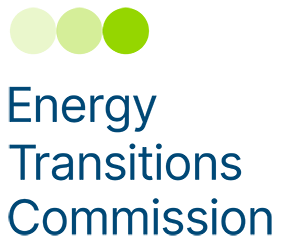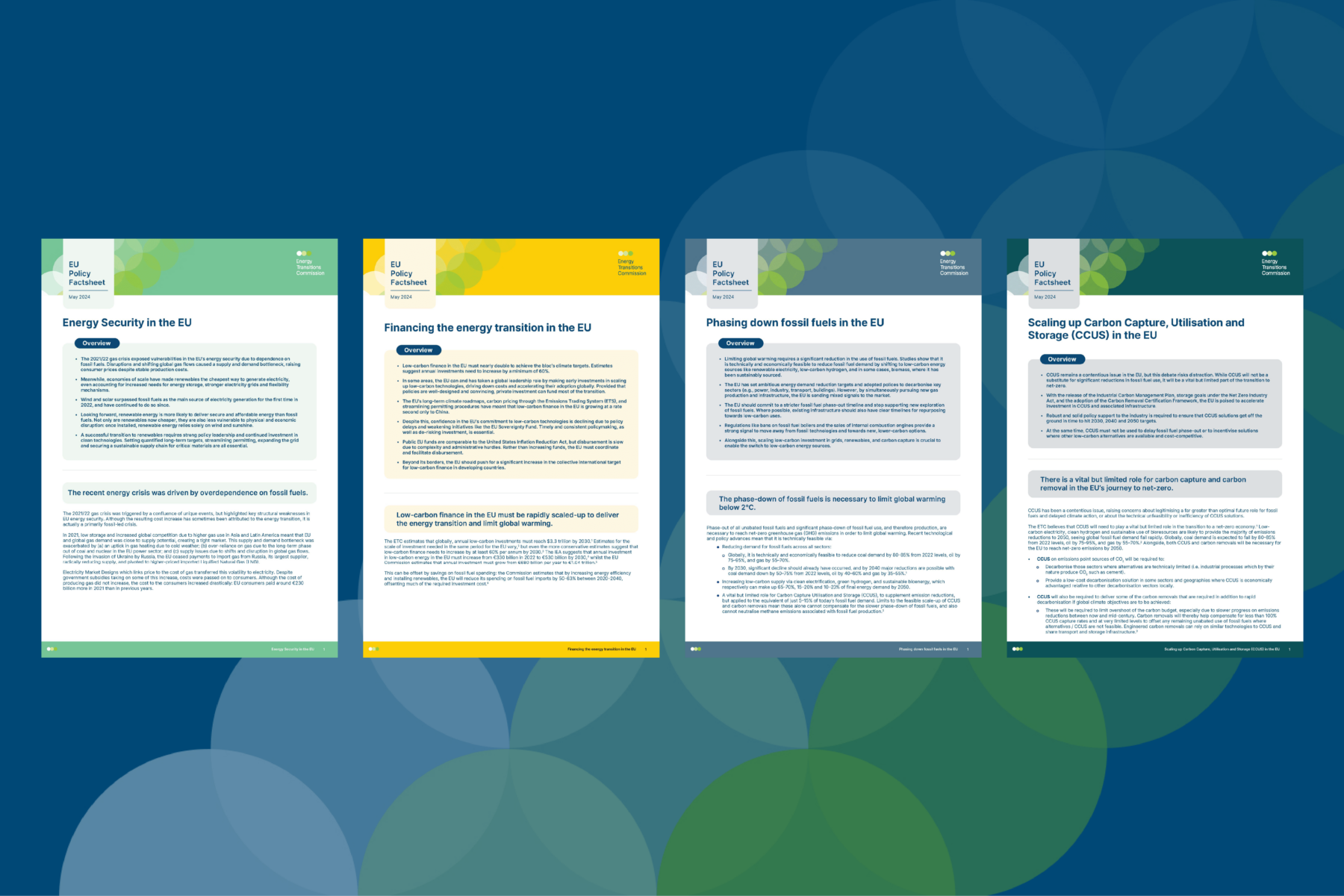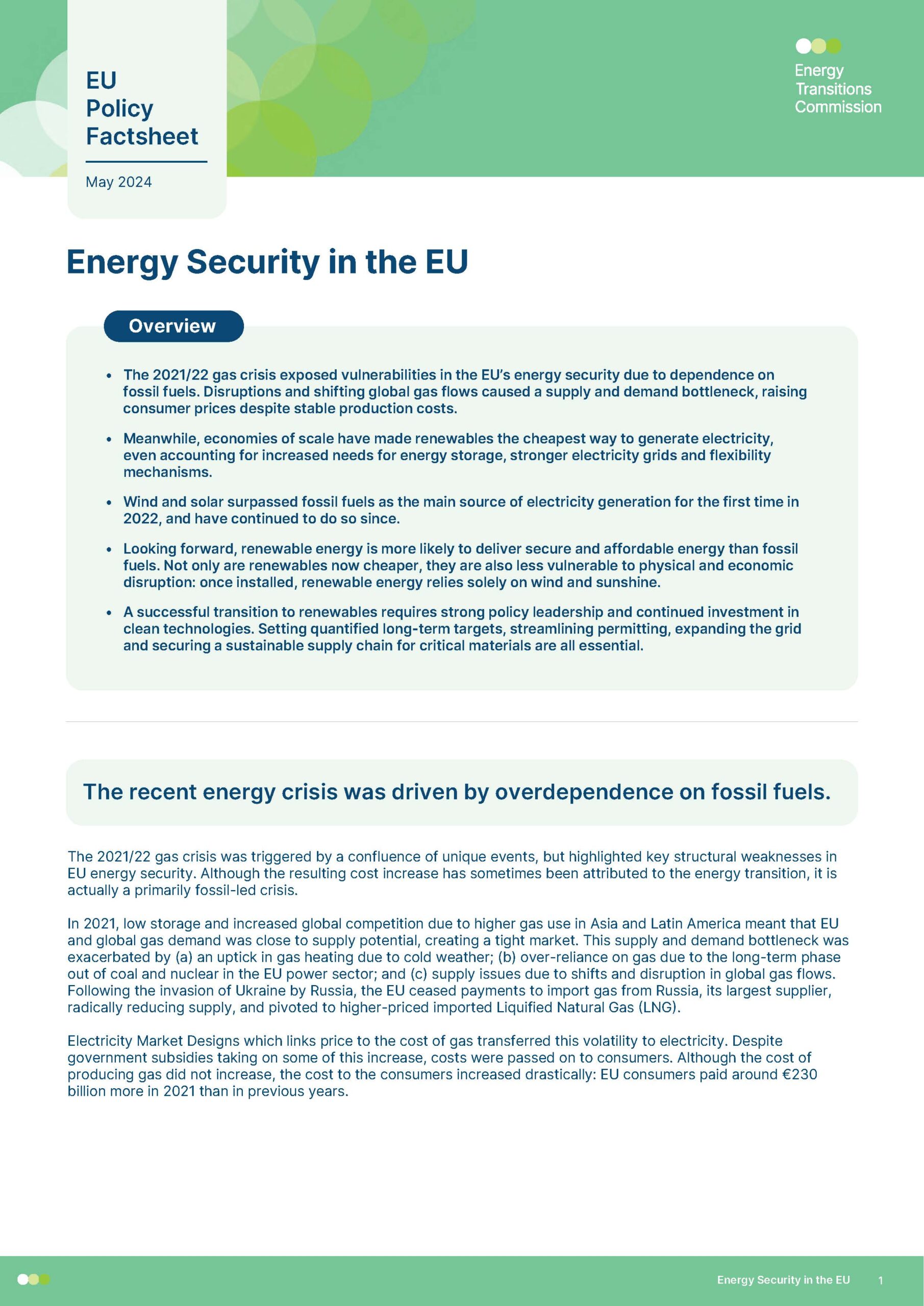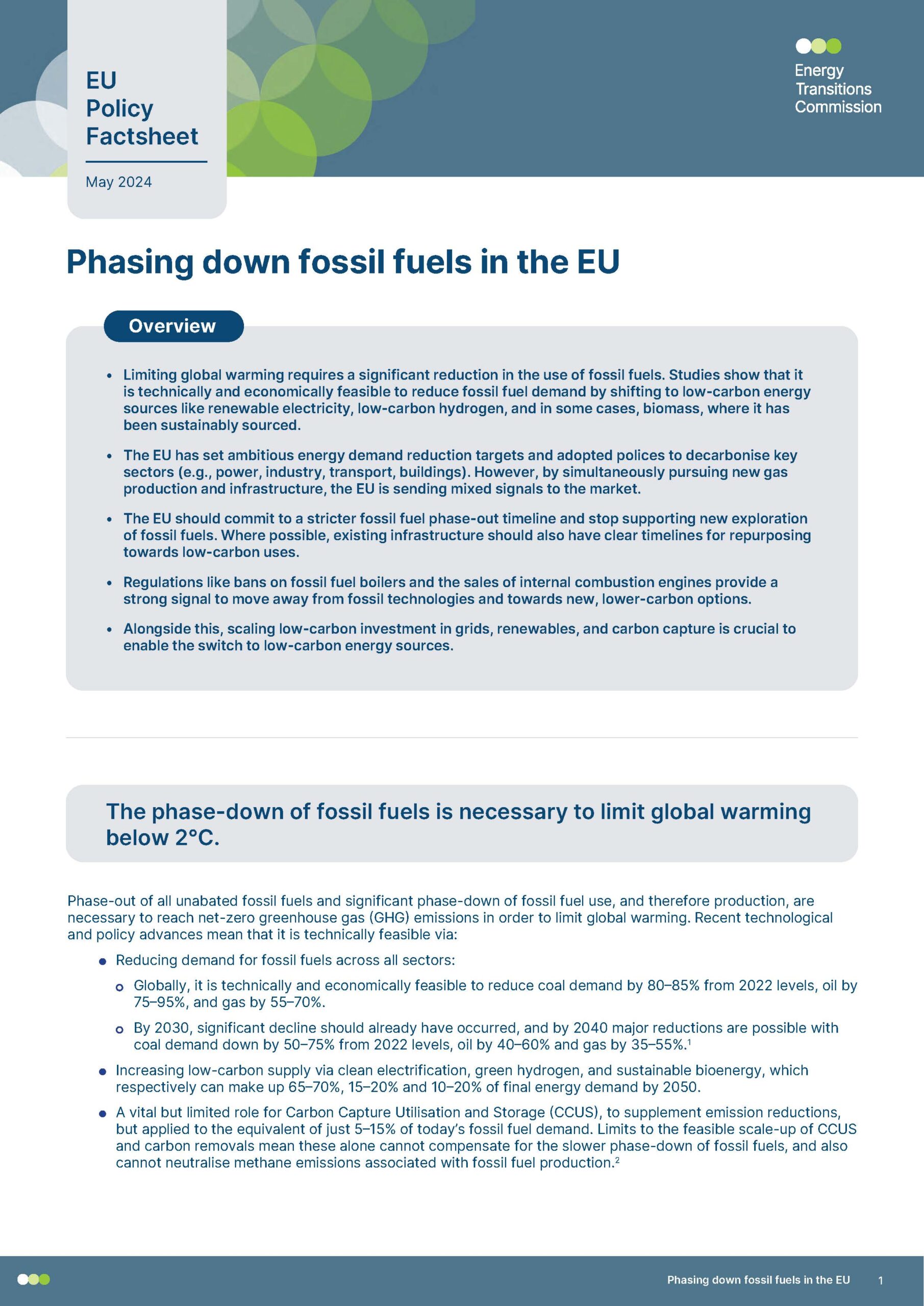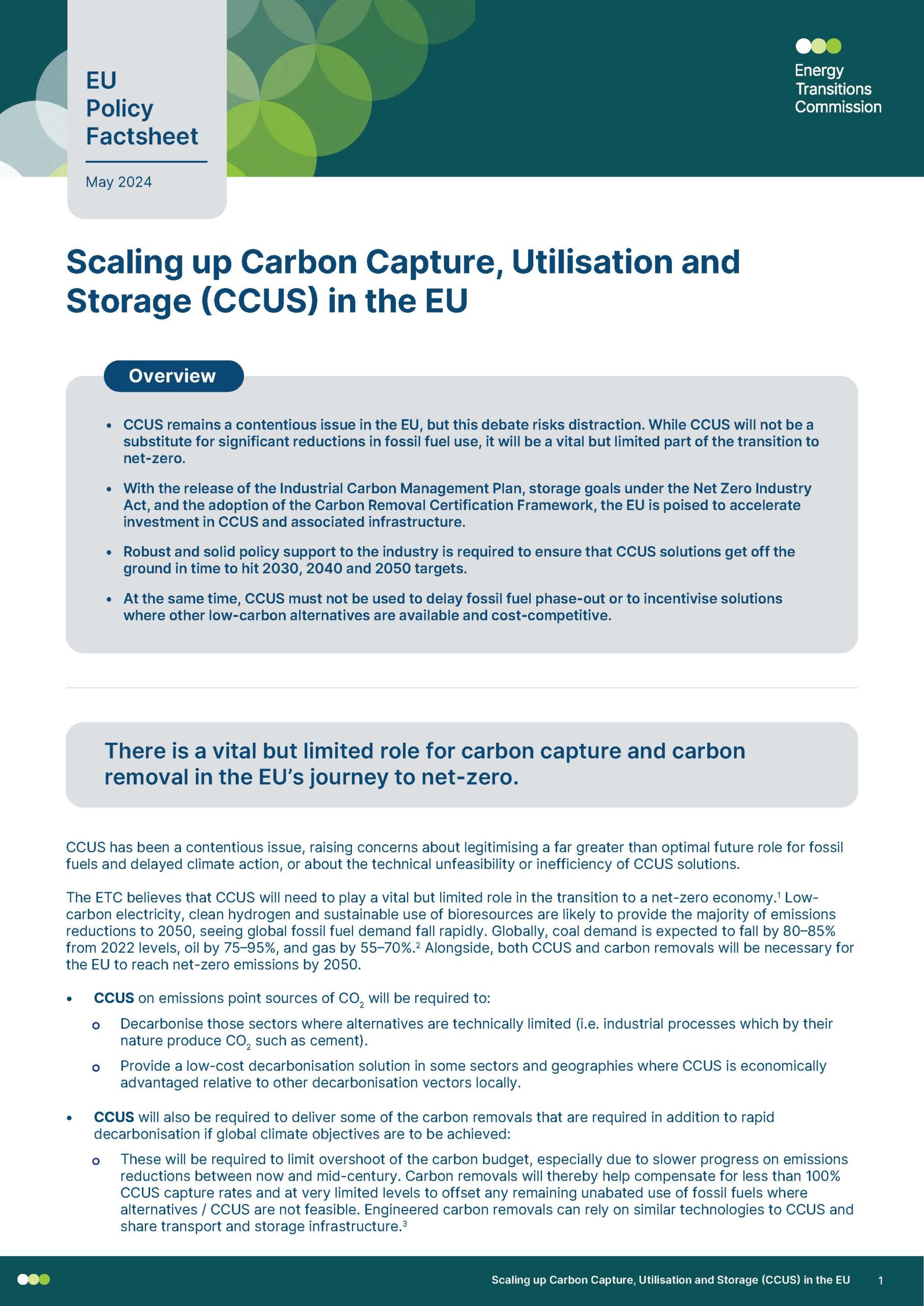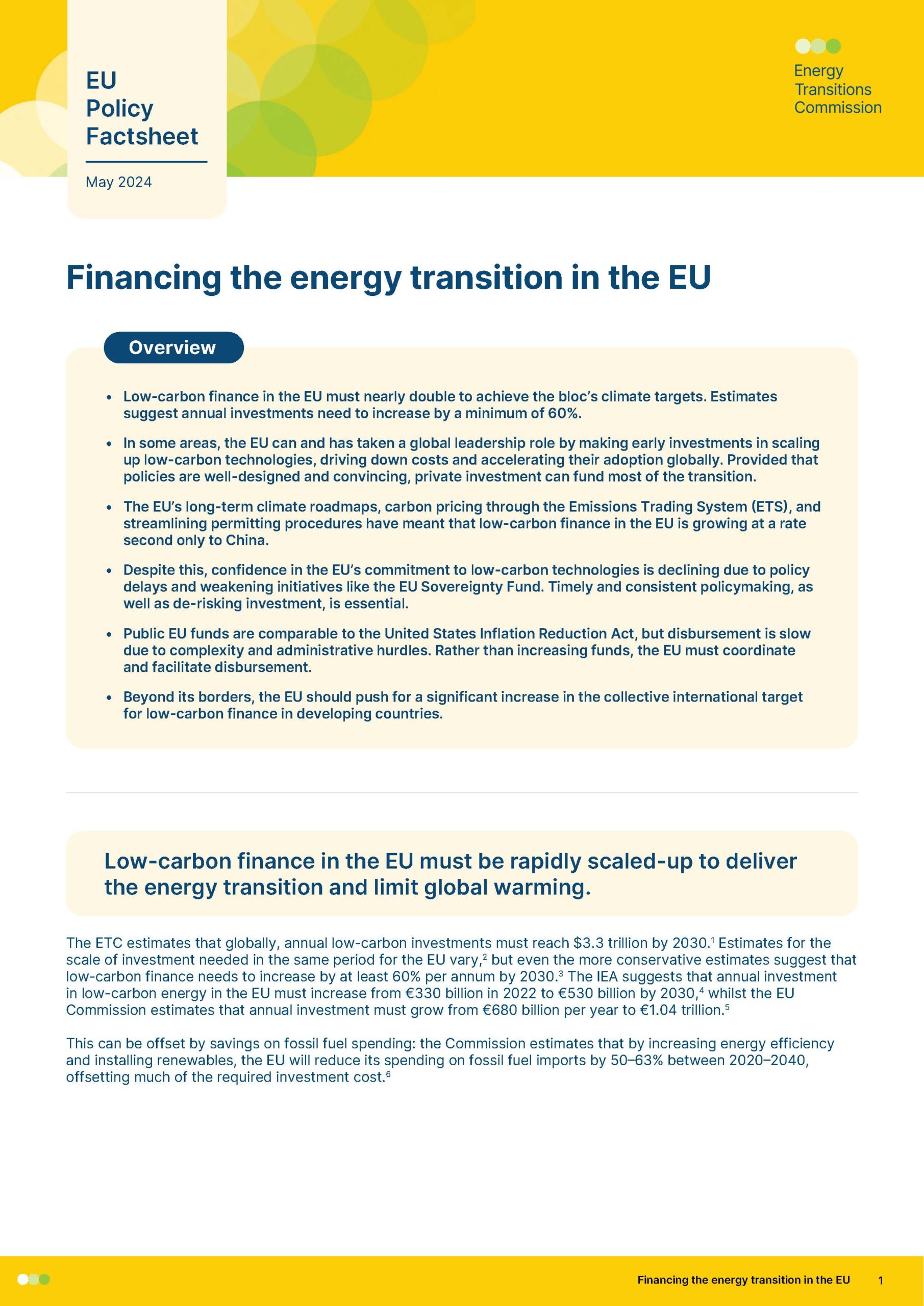The ETC has released a series of factsheets that have taken major ETC reports and adapted the key messages to the context of the energy transition in Europe. Covering the phase down fossil fuels, carbon capture, utilisation and storage (CCUS), financing the transition, and energy security, these factsheets bring a facts-based perspective to the current EU debates around energy.
Why the factsheets?
The 2024 European elections are a pivotal juncture for energy policy, particularly in the wake of significant strides made over the past five years. During this period, the EU witnessed sustained efforts aimed at reducing energy demand, deploying renewable energy sources, and advancing the transition towards a more sustainable energy landscape.
European Green Deal aims for climate neutrality by 2050, with a key target of at least a 55% net reduction in greenhouse gas emissions by 2030 compared to 1990 levels. In order to achieve this, the EU has passed a series of landmark sectoral policies, from targets for decarbonising shipping and aviation, to the recent adoption of the Energy Performance of Buildings Directive, through which the EU will encourage renovations, phase-out fossil fuel boilers, and aim for fully decarbonised building stocks by 2050.
Despite these notable achievements, much work remains to realize the emissions-reduction pathway that the Green Deal has set, and to create the investment environment needed to scale-up low-carbon solutions needed for the transition. The EU is still off-track to meet its target under the Nationally Determined Contributions framework, even while this target is insufficient for a 1.5°C pathway.
On top of this, with pockets of political opposition and competing priorities ahead of the upcoming elections for the EU Commission, there is a looming risk of losing momentum in the push towards a cleaner energy future. While deployment of wind and solar are picking up speed, voter confidence in the transition has eroded due to the Commission’s indecision around key issues, with major political parties pledging to revisit key policies including
The next Commission must not only safeguard the progress of the European Green Deal, but also urgently fill in the gaps. , limited time-bound commitments to phasing down fossil fuels, and a fractured financing landscape, all contribute to putting the EU journey to a net-zero future at risk.
In response to these challenges, these briefings capture the current key issues shaping the energy transition agenda, backed by facts. These insights are data-driven, apolitical, and industry-backed: they simply outline the concrete and feasible steps needed to advance the energy transition within Europe in time to remain close to a 1.5°C pathway. We hope that these factsheets can be used by our members and ETC ambassadors to strengthen the debate for the energy transition to continue moving forward in Europe, whether this means further adapting these EU factsheets to a specific Member State context or simply using them for speaking points. Please reach out for opportunities to collaborate on shaping the conversation around the EU’s transition.
What are the key messages?
Click the images below to download the factsheets
Renewables can deliver energy security in the EU
The 2021 gas crisis exposed vulnerabilities in the EU’s energy security due to dependence on fossil fuels. Disruptions and shifting global gas flows caused a supply and demand bottleneck, raising consumer prices despite stable production costs. The EU responded with the Fit for 55 package, and investment surged in solar and wind power, reducing reliance on fossil fuels. With economies of scale making renewable electricity generation and storage more affordable, it is becoming clear that renewables can offer both energy security and affordability.
However, strong policy leadership and continued investment in clean technologies are necessary to manage the transition and knock down remaining barriers: streamlining permitting, expanding the grid, and securing a sustainable supply chain for critical materials are all essential.
The EU must commit to phasing-down fossil fuels
Limiting global warming requires a significant reduction in fossil fuels. The EU has set ambitious demand reduction targets and adopted polices to decarbonise key sectors (power, industry, transport, buildings). However, it still drives new gas production and infrastructure, sending mixed signals and ultimately impeding the phase-down of fossil fuels.
The EU should commit to a stricter fossil fuel timeline and stop supporting new exploration and production. Existing infrastructure needs a clear plan of action to be repurposed for low-carbon uses. Regulations like bans on fossil fuel boilers and carbon border adjustments can incentivize lower-carbon options. Investments are needed in robust grids, clean energy infrastructure, and carbon capture and storage.
Scaling-up CCUS in the EU is necessary and urgent
CCUS remains a widely contested issue in the EU, but this debate risks distraction: while CCUS will not be a substitute for significant reductions in fossil fuel use, it will be a vital but limited part of the transition to net-zero. With the release of the , the EU is poised to accelerate investment in CCUS and associated infrastructure. Robust and solid policy support to the industry is required to ensure that CCUS solutions get off the ground in time to achieve 2030, 2040, and 2050 targets.
Strong policy can catalyse transition finance in the EU
Low-carbon finance in the EU must nearly to achieve the bloc’s climate targets. Private investment can fund most of the transition, but well-designed policies are needed. The EU’s long-term climate roadmaps, carbon pricing, and streamlining permitting procedures all play a role in attracting private capital. But confidence in EU’s commitment to low-carbon technologies is waning due to policy delays and weakening initiatives.
Timely and consistent policymaking, de-risking investment, and coordination and simplification of public funding can unlock waves of investment and attract private capital. The EU should step up to its major role in global climate finance, and push for higher international ambition.
